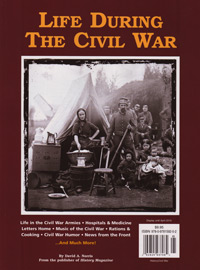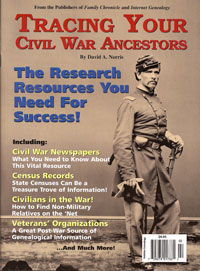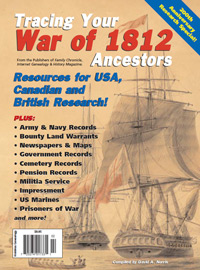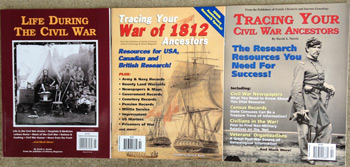To celebrate the Memorial Day weekend, Family Roots Publishing is offering a bundle of three popular American war-related research guides from the publishers of History Magazine.
FRPC is discounting them 30% through Memorial Day, May 26, 2014. Regularly 29.85, the bundle is just $20.95 (plus only $5.50 p&h!) The guides are as follows:
Click on the links to learn more about the individual research guides or to purchase just one of the items at 15% off during the holiday weekend. Hurry, as this sale ends at midnight MST Monday, May 26, 2014.
Following are reviews of each of the guides:
Life During the Civil War
 Life During the Civil War is an educational and entertaining collection of articles on the war, written by David A. Norris. Norris takes the reader beyond the battle fields and into the homes and occupations of Americans, including the soldiers, ans examines what they saw, heard, and felt during these trying years. Everyday life is the theme behind the collection. This publications answers, in vivid detail, what the average American experienced during the Civil War.
Life During the Civil War is an educational and entertaining collection of articles on the war, written by David A. Norris. Norris takes the reader beyond the battle fields and into the homes and occupations of Americans, including the soldiers, ans examines what they saw, heard, and felt during these trying years. Everyday life is the theme behind the collection. This publications answers, in vivid detail, what the average American experienced during the Civil War.
David Norris is an avid writer and historian with over 250 publications to his name. His publications have appeared online and in print in Family Chronicle, History Magazine, CNN.com, American History, Civil War Times, and many more. The Civil War has been a passion of his since childhood. In particular, he loves the personal stories. Anyone would be hard pressed to call him anything but an expert on American life during 1860s.
There are, in this publication, article which cover common, even expected, topics. Food and cooking, life in the military, and even photography are common enough topics to find in almost any expose on the war. However, Norris digs even deeper covering topics like humor, pets in the army, army laundresses, war artists, common medicines, naval life on an ironclad, and fundraising fairs. It seems like you will find it all in these 26 articles. You will learn about the war. If you have ancestors who lived at that time, then you will learn about their lives, the way the thought and lived. Best of all, you will have fun doing it.
Contents
OPENING NOTES – Notes From the Publisher, About the Author
FROM ABATIS TO ZOUAVES: A CIVIL WAR DICTIONARY – What were some of the popular sayings, slang, jargon and military terms in the 1860s?
TALE OF TWO CAPITALS: RICHMOND AND WASHINGTON – The war brought great changes to the lives of residents of Richmond and Washington
HOME AWAY FROM HOME: HOTELS OF THE CIVIL WAR – From four-star resorts to small town hostelries, hotel business boomed during the war
SOUNDTRACK TO A CONFLICT: MUSIC OF THE CIVIL WAR – Music, whether popular songs or military tunes, was as much a part of life then as it is now
STARVATION PARTIES AND CONFEDERATE CANDLES? – Southerners found unusual substitutes for scarce staples, like wheat, pins, shoe polish and coffee
SLUMGULLION, SALT HORSE AND HELL-FIRED STEW! – What did soldiers, and their families at home, eat during the war years?
RELIEF FROM REALITY: CIVIL WAR HUMOR – Popular humorists and jokes helped lighten hearts on both sides of the battle
SHINPLASTERS AND GREENBACKS: MONEY DURING THE CIVIL WAR – Banks, businesses, states, the Union and Confederacy all issued their own, incompatible, money
ZOUAVES: NEW YORK FIREMEN AND LOUISIANA TIGERS – Instead of the familiar blue and gray, some regiments donned bright colors and turbans
MAN’S BEST FRIENDS: PETS IN THE ARMY – From the exotic to the common, animals were kept as companions and mascots
JOHNNIE REB AND BILLY YANK: LIFE IN THE ARMIES – Fresh recruits and veterans of past conflicts faced new, and familiar,challenges in the Civil War
FIGHTING FOR FREEDOM: THE US COLORED TROOPS – African-American troops played a vital role in the Civil War
SUTLER SHOPS: CONVENIENCE STORES FOR SOLDIERS – Where did soldiers get ink, ginger snaps or Valentine cards?
LIFE ON SOAP SUDS ROW: ARMY LAUNDRESSES – Laundry was a grueling, but essential, duty in army camps
TAKING THE CARS: RAIL TRAVEL DURING THE CIVIL WAR – Though far from luxurious, or safe, trains became vital to the war effort and civilian life
WHAT THE DOCTOR ORDERED: HOSPITALS AND MEDICINE – Hospitals were understaffed, undersupplied and relied on dangerous cures and treatments
COMMON CIVIL WAR MEDICINES – Hospitals stocked standard treatments of the day, including mercury, opium and brandy
FUNDRAISING FAIRS: THE US SANITARY COMMISSION – Volunteer groups raised millions of dollars to improve military hospital and camp conditions
PICTURING THE CIVIL WAR: WAR ARTISTS – Before modern photography and TV, how did people get a glimpse of the battles?
FROM THE FRONTLINES TO THE HOMEFRONT: NEWSPAPERS – Despite shortages of labor and ink, papers fed the public appetite for news and entertainment
TELEGRAMS: AT THE SPEED OF LIGHTNING – The telegraph became an indispensable part of military and commercial communication during the war
WORTH A THOUSAND WORDS: PHOTOGRAPHY IN THE CIVIL WAR – Despite technological limitations, photography boomed during the Civil War
“I HAIN’T GOT ANY STAMPS”: CONFEDERATE AND UNION MAIL – Two postal systems kept soldiers and families in contact across shifting battlelines
THE CIVIL WAR NAVIES: COTTONCLADS AND BLOCKADES – Whether they patrolled rivers or the South Pacific, a sailor’s life was far different than a soldier’s
THE NEW NAVAL WARFARE: LIFE ON IRONCLADS – Heavily armored ironclads offered unique advantages, and dangers, to their crews
MISSED IT BY THAT MUCH…! – From aseptic surgery to moon landings, the years after the Civil War were full of amazing changes.
Order your individual copy of Life During the Civil War from Family Roots Publishing at 15% off during the holiday weekend; Item #: MM001 – or order the American Wars Research bundle for 30% off.
Tracing Your Civil War Ancestors
 Tracing Your Civil War Ancestors is a collection of articles written by Civil War expert David A. Norris. These articles bring together Norris expertise on the War with his passion for genealogy. These articles examine all different types of records, both military and civilian, to hep the researcher identify potential resources and to find those critical records.
Tracing Your Civil War Ancestors is a collection of articles written by Civil War expert David A. Norris. These articles bring together Norris expertise on the War with his passion for genealogy. These articles examine all different types of records, both military and civilian, to hep the researcher identify potential resources and to find those critical records.
As the country, over a four year periods, recognizes the 150th anniversary of America’s most troubled period, genealogists can take advantage of the spotlight on the war as means to find even more historical data and records than ever before. To see how this collection can help the researcher discover ancestral information from this time period, see the following list of articles presented in this 82 page journal:
- The First Steps to Finding a Civil War Ancestor – Some thoughts and tips on getting started in Civil War research.
- Companies and Regiments: Civil War Army Units – Knowing how the armies were structured will help you understand records and references.
- Non-Regimental and “Untypical” Soldiers – Some tips for finding soldier ancestors in unusual categories.
- Emergency Troops, Militia and Home Guard – Records of temporary units might reveal a hard-to-find ancestor’s service.
- Ensigns and Engineers: Ancestors in the Navies – Though tracking a relative in the navy can be challenging, there are many valuable resources available.
- US Colored Troops and African-American Sailors – Here are some resources for African-Americans who served in the Civil War.
- Southern Loyalists and “Galvanized Yankees” – Here are some resources to check for Southern ancestor’s who served with the Union.
- To Helmira and Back: Prisoners of War – POW resources can fill in holes in your ancestor’s record, or reveal the fate of a missing ancestor.
- Medical Records and Hospital Personnel – Records from Civil War hospitals contain a wealth of information on soldiers and staff.
- Military Pay Resources – Civil War payroll records pay off again for genealogists.
- The Civil War and the Census – Pre- and postwar censuses offering important information on the lives and families of veterans.
- The 1865 Parole Lists: To the Very End – These documents list the Confederate soldiers who endured to the end of the war.
- Finding You Ancestors’ Flags – Regimental flags had important practical and symbolic purposes for Civil War Soldiers.
- Buried in History: Civil War Cemeteries – Finding a soldier’s grave can seem impossible, but it doesn’t have to be a lost cause.
- Civil War Pension Records and Wartime Relief – Pension records are a genealogical treasure trove for soldiers and their families.
- Confederate State Pension Resources – A state-by-state guide to locating Confederate pension records.
- Soldiers’, Sailors’ and Widows’ Resources – The records of these institutions may contain a wealth of detail that can’t be found elsewhere.
- Civil War Veterans’ Groups – Records of veterans’ organizations might let you follow your ancestor into the 20th-century.
- Wartime Civilian Records– Relatives who were not in the military may still have left a wealth of information about their lives.
- Amnesty Papers and Southern Claims – Some potentially helpful sources for Southern relatives.
- Spies, Smugglers and “Disloyal Citizens” – Records of civilian prisoners include ordinary citizens, political prisoners, and even politicians.
- Finding Civil War Income Tax Records – You might find that your ancestors’ 1860s tax records are a source of family history.
- A Gift From the Past: Civil War Newspapers – Here are some tips on finding your newsmaker ancestors.
- A Picture in time: Civil War Era Photographs – You can find photos of people and places connected to your family, or even your ancestors.
- Best of the Best: Classic Civil War Resources – These records contain the most essential information for Civil War Research.
- National Archives Records – A soldier’s Compiled Military Service Record contains some of the most essential details of his service.
- Finding Your Way Through the Civil War With Maps – Maps can help you follow your ancestor during the war or find a family farm near a battlefield.
Don’t miss this opportunity for a great deal on expert advice to finding Civil War era records and document. The booklet is heavily illustrated, highly informative, and a great value at only $9.95 less 15% this weekend! Order your copy of Tracing Your Civil War Ancestors from Family Roots Publishing; Item #: MM004 – or order the American Wars Research bundle for 30% off!
Tracing Your War of 1812 Ancestors
 Created as a “200th Anniversary Research Special, Tracing Your War of 1812 Ancestors, covers resources for the United States, Canada, and British research. Moorshead Magazines, publishers of Family Chronicle, Internet Genealogy, and History Magazine, have published this special volume in memory of, and to provide assistance in researching, the War of 1812. This 82 page special offers 19 articles, covering such topics as:
Created as a “200th Anniversary Research Special, Tracing Your War of 1812 Ancestors, covers resources for the United States, Canada, and British research. Moorshead Magazines, publishers of Family Chronicle, Internet Genealogy, and History Magazine, have published this special volume in memory of, and to provide assistance in researching, the War of 1812. This 82 page special offers 19 articles, covering such topics as:
- Army & Navy Records
- Bounty Land Warrants
- Newspapers & Maps
- Government Records
- Cemetery Records
- Pension Records
- Militia Service
- Impressment
- US Marines
- Prisoners of War
- And More!
Major events, especially war, generates mountains of records, histories, and documents. Newspapers, government and military records, and other records offer names and details about our ancestors which may not have been documented if not for these historical events. Regular contributor and expert David A. Norris has compiled helpful guides, a chronology of events, an introduction, and other articles for this publication; providing, great insight into evaluating potential sources of information and hunting those sources down.
Contents
War of 1812: Introduction
An introduction to look at what resources are available to researchers
Chronology & Outline
An outline of the war, and the causes and resolution
US Government Records
Local government records could reveal details of an ancestor’s home and life
Canadian War of 1812 Records
Published and online sources make tracking Canadian soldiers much easier
British War of 1812 Records
Tips on resources for locating ancestors who may have fought with the British Army or Royal Navy
US Army Records
A bit of digging might uncover a treasure trove of information on an ancestor in the US Army
United States Marines
Although US Marines were a small force in 1812, a number of resources exist for them
Naval Records
New resources provide valuable details on the lives of sailors in the US Navy
Prize Money: Spoils of War
Prize money could more than double a sailors pay
Militia Service
Most veterans of the War of 1812 served brief periods in the militia
Bounty Land Warrants
Land bounty records are a valuable source of information on veterans and their heirs
Cemetery Records
A number of resources are available that can help you locate burial sites
Impressment
Maritime records are useful research tools and document a tumultuous era
Maps
Historic maps help bring the War of 1812 era, and your family history, to life
Pensions
Pension files can reveal where your ancestor was born, where they lived and died and more
Privateer & Naval Pensions
An important genealogical resource for anyone researching a maritime ancestor
Newspapers: Breaking News!
Newspapers of the War of 1812 era are a valuable genealogical and historical resource
Prisoners Of War
Records of prisoners of war can provide additional details of an ancestor’s life
Last Survivors
As a rule of thumb, the last survivor of a war will live roughly 90 years after the war
Individual opies of Tracing Your War of 1812 Ancestors are available from Family Roots Publishing at $9.75, less 15% – of order the American Wars Research bundle for 30% off! Hurry, as this offer ends at midnight MST, Monday, May 26, 2014.
